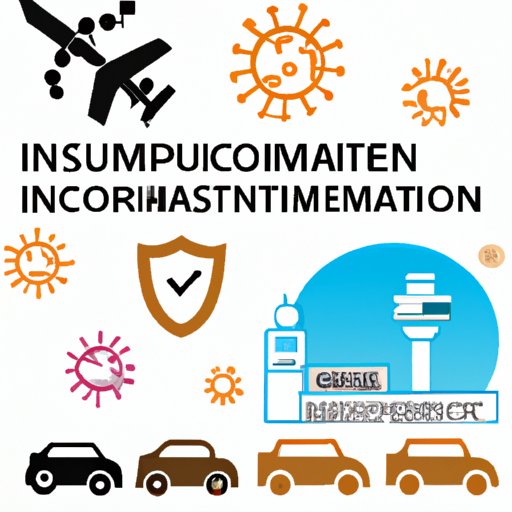Introduction
An immunocompromised person is someone whose immune system is weakened or suppressed, making them more vulnerable to infections and illnesses. For this population, travel can present unique challenges and risks that need to be considered before embarking on a journey.
In this article, we’ll explore the risks and benefits associated with travel for immunocompromised patients, as well as strategies to minimize risk. We’ll also discuss how to safely navigate airports and other transportation hubs, what to consider when planning a trip, and the pros and cons of vaccinations.
Examining the Risks and Benefits of Travel for Immunocompromised Patients
For immunocompromised patients, there are potential health risks posed by unfamiliar environments. This could include exposure to new germs and viruses, as well as allergens and pollutants that may not be present at home. Additionally, it can be difficult for immunocompromised patients to access medical care in an unfamiliar place if they do become ill.
On the other hand, there are many benefits to travel for mental and physical health. Getting out of the house and exploring a new place can help reduce stress and improve overall wellbeing. It can also be an opportunity to build relationships and create lasting memories.

Exploring Strategies to Minimize Risk for Immunocompromised Patients Who Choose to Travel
If you’re an immunocompromised patient considering travel, there are several strategies you can employ to reduce your exposure to germs and viruses. Start by researching the destination to learn about any potential health risks. Consider the climate and seasonality of the area, as well as the availability of medical care if needed.
When packing for your trip, make sure to bring along any necessary medications and medical supplies, as well as items like hand sanitizer, disinfectant wipes, and face masks. Try to limit contact with shared surfaces as much as possible, and wash your hands frequently.

How to Safely Navigate Airports and Other Transportation Hubs for Immunocompromised Patients
Airports and other transportation hubs can be breeding grounds for germs and viruses, so it’s important for immunocompromised patients to take extra precautions when travelling through these areas. Before leaving, research the policies of the airport or transportation hub to find out what services are available, such as pre-boarding screening and sanitization stations.
Once you arrive, try to limit contact with shared surfaces as much as possible. Wear a face mask and gloves if possible, and always wash your hands frequently. If you’re feeling unwell, alert a member of staff immediately.
What to Consider When Planning a Trip for an Immunocompromised Patient
When planning a trip for an immunocompromised patient, it’s important to choose a destination that takes into account their medical needs. Research the local healthcare system and find out what services are available in case of an emergency. Also consider the climate and seasonality of the area, as some climates and seasons may be more conducive to infection than others.
It’s also important to plan for any medical needs the patient may have during the trip. Make sure to pack any necessary medications, medical supplies, and equipment. Additionally, it’s a good idea to research nearby medical facilities in case of an emergency.

The Pros and Cons of Vaccinations for Immunocompromised Patients Who Travel
Vaccinations can be beneficial for immunocompromised patients who travel, as they can protect against certain illnesses and diseases. However, it’s important to note that not all vaccines are safe for immunocompromised patients, and it’s best to consult with a healthcare provider before taking any vaccinations.
Additionally, some vaccinations may not be effective for immunocompromised patients, as their weakened immune systems may not be able to produce a strong enough response to the vaccine. In these cases, it’s best to speak with a healthcare provider to determine the best course of action.
Conclusion
Traveling with an immunocompromised patient presents unique risks and challenges, but there are strategies to minimize these risks. It’s important to research the destination, pack essential items, and take precautions when navigating airports and other transportation hubs. When planning a trip, consider the medical needs of the patient and research local healthcare facilities. Finally, discuss the pros and cons of vaccinations with a healthcare provider.
Ultimately, it’s important to weigh the risks and benefits of travel for immunocompromised patients and discuss plans with a healthcare provider. With the right preparation and precautions, travel can be a rewarding experience for immunocompromised patients.
(Note: Is this article not meeting your expectations? Do you have knowledge or insights to share? Unlock new opportunities and expand your reach by joining our authors team. Click Registration to join us and share your expertise with our readers.)
